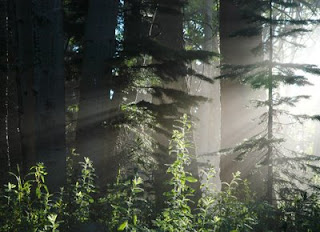
“You sold out,” accused my friend, a critic but friend nonetheless.
“I did no such thing,” I answered indignantly.
“What?” she asked. “Are these trees here different than those over there? How can you defend one bunch and not another?”
“I’ve re-evaluated my footprint,” I said. “I’m choosing my battles. I only have so much fight left in me, and I need to concentrate my energy where I think it’ll do the most good.”
I considered that a pretty good answer. It still sounded reactive and defensive, though. I call myself a treehugger and don’t like it when respected colleagues get in my face. Fifteen years ago I’d have been the critic. No one said it would be easy.
Easy or not, the wheel has turned from brown cloud to the vigorous green of awareness under the Obama Administration. The pendulum swings. Nor does it hurt that Earth Day morphed into Earth Week; only one week to be green. Suddenly—we are so psyched—everybody and everything is green.
This isn’t a bad thing. It is backlash from previous environmental wreckage. It could facilitate a return to sensible and scientific policy decision-making. What a concept. It is ironic though, to witness the turnaround from just a few years ago, when it was cool to be as greedy as we wanted to be, with little regard for the world in general. George Bush gave us that.
While enjoying our born-again green awareness, though, we must beware what we used to call “greenwashing.” Now we call it business as usual, whether green or not. Greenwashing is corporate and political slathering of a thin layer of green paint over the egregious brown cloud. It isn’t deep and authentic green; instead it is spin orchestrated to make the consuming public believe it’s all good. We’re on the path to environmental consciousness and a sustainable future. It’s a feel good thing, isn’t it?
True to my belief that balanced attention to television is a good barometer of popular opinion and conventional wisdom, green pixels flood from the glowing box. Green commercials are legion. Green products abound, whether or not their net impact on the planet is negative or positive. Green in the cash box is what counts.
On the internet I found green mortgages, green lenders, green politicians, green action funds, green learning sites and no lack of green spending sites. I visited MSN’s Lifestyle site where they encouraged me to “get my green on.” They invited me to tour ten coastal eco-resorts, and thoughtfully provided an Earth Day shopping guide. At Twitter I can join Generation Green to receive tips and tricks on how I can take action to protect my planet.
FOX News tells me sternly: “Green it. Mean it.” FOX wants to partner with me, “to help take simple steps that will help deliver a better planet to the next generation.” That makes me all tingly. These are the guys that bring us Bill O’Reilly, Sean Hannity and Greta Van Susteren. Green me up, Scottie!
NBC Nightly News featured an Earth Week series on the planet’s oceans: how we are filling them with trash and killing coral reefs. Part of the series described the crash of world fisheries by pollution or over-fishing. NBC neglected to mention a story reported a few months previously about Alaska’s proposed Pebble Mine and its threat to the Bristol Bay salmon fishery. Bristol Bay is one of the North Pacific’s most important fisheries. How green is that?
Green may be with us for a while. We will either figure out how to minimize our footprint or not. If not, we’ll keep pretending we are. Individual personal choices may yet be the best way to be green; those choices might mean not buying the green product, not buying anything at all.
I remarked on a friend’s new mid-sized pickup truck. Formerly she drove a big F-350.
“It’s my husband’s way of conserving,” she told me, “but I still have the other truck.”

No comments:
Post a Comment